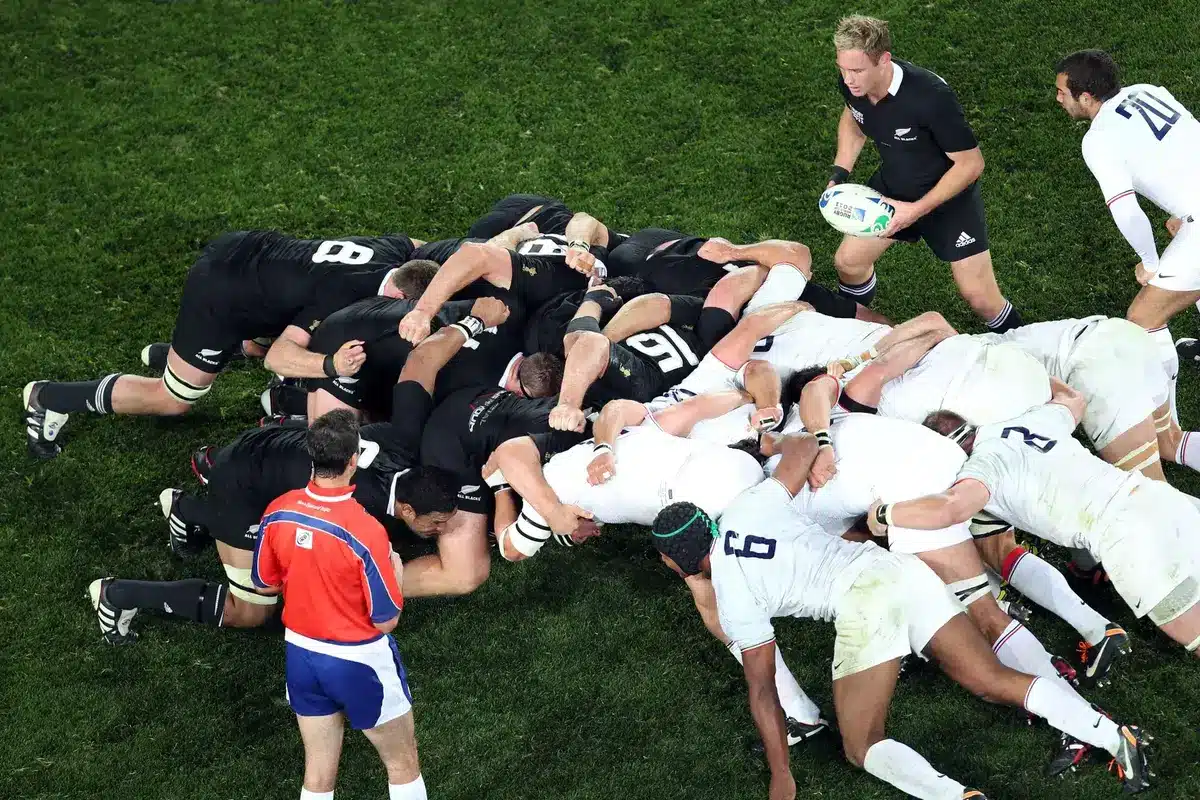France has drawn a line in the mud — and this time, it’s personal. Channeling the spirit of Winston Churchill, the nation’s refereeing chief has declared all-out war on crooked scrum feeds.
Join RUCK’s Instagram broadcast channel and get the latest rugby news straight to your phone.
Mathieu Raynal, now steering officiating across the Top 14 and Pro D2 alongside Romain Poite, isn’t content to just blow the whistle.
He’s driving a revolution — one aimed squarely at delivering fixed scrum feeds and restoring old-school fairness to the set-piece battle.
France ditched the shoulder-aligned feed, forcing nines to square up and throw straight. The result? Chaos, competition, and a flood of penalties — 41 in six rounds, compared to 23 over four seasons. Pro D2’s no different.
While England and the URC look away, France is scrumming for honesty — one feed at a time.
“I did not just wake up in the morning and decide,” said Raynal “This has come from the coaches. Ninety per cent of feeds last season were straight into the second row. We want more equity. I have said to them: ‘OK, we will referee it, but we will not do one step back in a month when everyone complains.’
“And that’s exactly what has happened. They are starting to complain. And I have said to them: ‘We will continue to do it.’ We now have some defensive scrums winning against the head, with a shove or hook. It needs to be a fair fight in the scrum.
“Every two months, I have a meeting with all the scrum coaches in France and the referees. We put on the table what went well and what didn’t. Feeding will be on the table in every meeting from now until the final. But, they are adapting now. Credit to them and to the players they have taken it seriously and done it.
“What did Churchill say? ‘If we are together nothing is impossible. If we are divided, all will fail.’ Everyone thought it was impossible and one day someone thought that it wasn’t.
“Maybe other countries will say we are crazy, maybe some of our French stakeholders will, too. But we will continue.
“We’re thinking about the general interest in our sport. I don’t care about personal interests of a club, coaches or myself. If I fight for consensus, I think it’s important for our sport.”
“Goodbye, caterpillar ruck” – Five more rugby law changes for 2026
Rugby has always balanced its proud traditions with the need to evolve. Yet, as the modern game grows faster, stronger, and more strategic, some long-standing laws may no longer serve their original purpose as effectively.
World Rugby has shown a readiness to adapt in recent years—these ideas could mark the next step in that ongoing evolution.
Join RUCK’s Instagram broadcast channel and get the latest rugby news straight to your phone.
1. No more draws
Rugby is one of the most thrilling sports in the world, but draws often leave players and fans frustrated. After 80 minutes of hard-fought action, neither team winning can feel unsatisfying and anticlimactic. Introducing golden point—where the first score in extra time wins—would give matches a clear, decisive ending.
Golden point also encourages attacking rugby. Teams would be pushed to take risks, go for tries, or attempt drop goals rather than playing safe for a draw. Every possession would matter even more, and fans would be treated to the kind of high-stakes drama that other sports, like rugby league and AFL, have long enjoyed.
It would make competitions simpler and fairer too. League tables, knockout tournaments, and international fixtures often rely on tiebreakers to separate teams after draws. Golden point ensures there’s always a winner on the scoreboard, rewarding performance rather than chance or points difference.
Player welfare concerns can be managed by limiting extra time to short bursts—say two five-minute halves or a first-score-wins rule within 10 minutes—keeping the game exciting without overtaxing athletes.
Golden point wouldn’t just make rugby more exciting—it would make it fairer, more competitive, and in tune with the modern expectation that every game should have a winner. With more tight contests in both club and international rugby, there’s never been a better time to adopt it.
2. Fewer Substitutions
Rugby has changed significantly over the years, and one of the biggest shifts is how the bench is used. These days, teams often bring on almost an entirely new forward pack late in the game. Big, fresh players crash into tired defenders, making the final 20 minutes less about skill and endurance, and more about brute force. Many fans and former players feel this has turned rugby into a collision sport rather than a contest of stamina and intelligence.
Reducing the number of substitutions would encourage players to pace themselves. Space would open up in the second half, creating more opportunities for creative play rather than endless phases of pick-and-go. It would reward fitness, smart decision-making, and those capable of performing for the full 80 minutes.
Fewer substitutions wouldn’t just make the game more exciting—it would make it fairer, safer, and more in line with the spirit of what rugby has always been about.
With the rise of 6–2 and even 7–1 bench splits, pioneered by Rassie Erasmus, the trend seems to be heading in the opposite direction. That’s all the more reason to act now.
Like this:
Like Loading…

